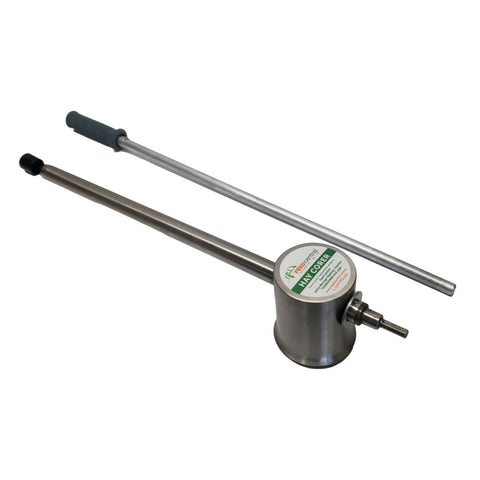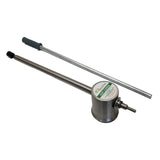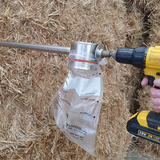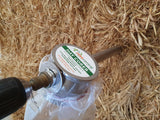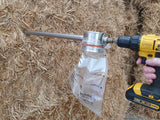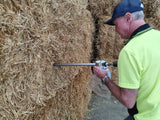Hay Corer
Developed by the Feed Central Hay Inspectors, this stainless steel hay corer is ideal for the collection of samples for quality assurance and feed testing purposes. It simply attaches to your cordless or corded 1/2" drill.
This is simple collection of samples and helps prevent contamination from handling. To use, drill into baled forage and use the cleanout rod to push the sample into an attached bag.
The attached forage cutting tip is able to be sharpened for an extended lifespan, or able to be ordered as a repair part.
Items Included:
- Hay corer
- Clean out rod
- Hay Corer Storage Satchel
- Clip Seal bags
Forage analyses required for animal ration balancing Proper hay & forage analysis requires a good forage sample. Taking a good sample requires a hay corer. The hay corer allows recommended samples of chopped forage to be gathered quickly and easily without contamination from handling.
Hay probe sampling procedure
Care should be taken when sampling hay. Samples should be uniformly obtained from several bales (10 bales minimum) throughout each sampling lot. Avoid sampling only one or two areas in the lot. Each sampling lot should be defined by date baled, cutting, forage type and pasture, and owner or farm name. Indicate if the hay was rained on while curing. Any significant event that could cause changes in forage quality would be reason for separating those samples into a different lot. For a large sampling lot (more than 50 bales), it is advisable to gather several hay samples for analysis.
Haylage / Wrapped Silage
Drill to the full depth of the hay probe in at least 12 random locations throughout the wrapped bales. Use the clean out rod to simply push the sample into the bag. When finished, tape the 1” holes in the haylage or wrapped silage made from the sampler.
Careful handling ensures accurate results
The handling of the hay sample is important to get accurate results. The sample cannot be exposed to air, as it will lose moisture. Samples left in the sunlight usually will have the moisture condensation on the plastic bag. Poorly sealed samples will lose fines or a portion of the sample. All of the above will affect the results. Care should be taken to keep samples in a cool location and packed securely to prevent sample spillage. Be sure that identification is secure and is written with a marking pen that is waterproof. Shipping containers should be the correct size to prevent excessive movement. Zip lock bags need to be packed securely. Do not hold samples for an extended time. Reduce risk of error by expediting analysis.

